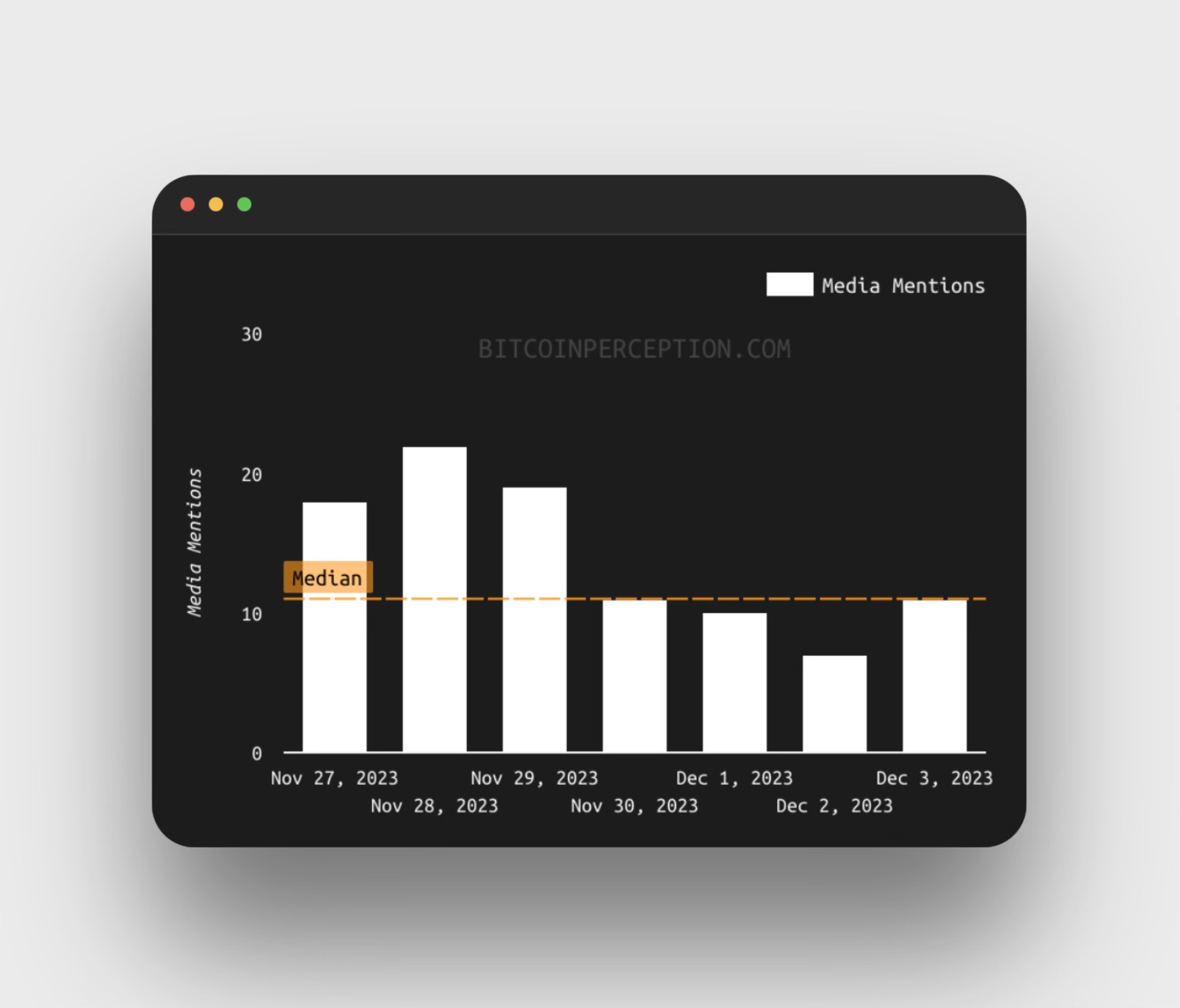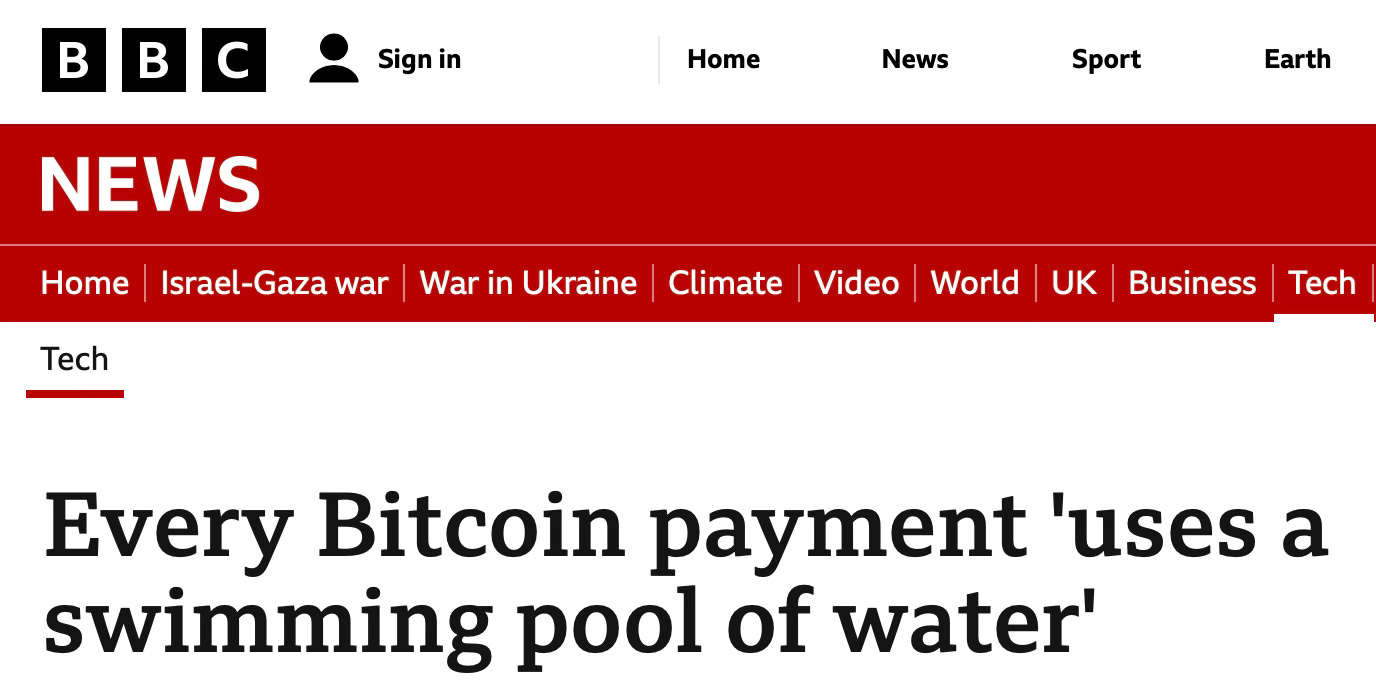Weekly Media Recap #21

Welcome to the latest edition of Bitcoin Perception.
Leading companies like Swan, Galoy, Braiins, Blockstream, and BTC Media rely on these weekly reports for insights.
Join them and many others in discovering how mainstream media is shaping the narrative around Bitcoin.
EOW closing Bitcoin price: $39,951
Date range: November 27 - December 3, 2023
Main Topics: Legal Challenges, Market Dynamics, Environmental Impact, Future Trends
This week's spotlight: The Independent & BBC
Weekly Snapshot



Main Topics Of The Week
Legal Challenges
Articles from Reuters and Daily Mail highlight concerns about cryptocurrencies being used for illicit activities, including financing terrorist groups.
The Los Angeles Times takes a critical stance on the crypto industry. However, lumping Bitcoin with the rest and implying undue U.S. lawmaker support due to its alleged criminal ties, while dismissing its benefits over fiat for the Global South, shows a clear disconnect.
Market Dynamics
Articles from Forbes and CNBC discuss Bitcoin's recent price surge and its potential future trajectory. They highlight investor optimism, especially regarding the approval of Bitcoin ETFs, and how this could reshape investment strategies.
This Reuters article emphasizes the positive impact of Bitcoin's rally on crypto-related stocks and the broader market sentiment.
Environmental Impact
These Independent and BBC articles raise false concerns about the environmental impact of Bitcoin mining, particularly its significant water usage. More on this in this week’s spotlight below.
Future Trends
This Week's Spotlight: The Independent & BBC


The environmental implications of Bitcoin have once again captured the attention of mainstream media, with recent articles from the BBC and The Independent sparking intense debate over Bitcoin's water usage.
So for this week’s spotlight, let’s delve into these claims, examine their methodology, potential misinformation, and some of the counterarguments presented by Daniel Batten, Managing Partner and Co-Founder of CH4 Capital, who took the the time to write up a solid rebuttal.
The Media's Stance
The BBC's "Every Bitcoin payment 'uses a swimming pool of water'" and The Independent's "Bitcoin consumes as much water as all the baths in Britain" painted a picture of Bitcoin mining as a significant water consumer.
These claims were based on the assumption that Bitcoin's energy consumption, largely from power plants, directly translates to substantial water usage.
Daniel Batten challenged the methodology used in these articles, arguing that the BBC’s estimates of Bitcoin's water usage were derived from generalized U.S. data on power and water usage, lacking direct measurement of water specifically used for Bitcoin mining.
Batten also pointed out the misleading nature of the BBC article's headline, which inaccurately equates Bitcoin transactions with payments, leading to an exaggerated portrayal of water usage.
He clarified that a single Bitcoin transaction can encompass thousands of payments, rendering the per-transaction water usage metric deceptive.
The Fallacy of "Energy Use per Transaction"
The concept of gauging Bitcoin's environmental impact by 'energy use per transaction' has repeatedly been debunked throughout its history of environmental critiques.
What this “metric” fails to accurately reflect is the energy dynamics of Bitcoin's network, as the consumption isn't directly tied to individual transactions. This approach has been used to overstate Bitcoin's environmental footprint.
Beyond the questionable methodology, the BBC-cited study by Alex de Vries, a data scientist at De Nederlandsche Bank (part of the European System of Central Banks), raises conflict of interest concerns.
His position suggests a bias in depicting Bitcoin in a negative light.
Or is he just a 21st century Luddite?
The Need for Balanced Reporting
The coverage of Bitcoin's environmental impact in mainstream media has for many years needed a more nuanced and accurate approach.
While the BBC and The Independent articles may highlight important environmental considerations, their lack of objectivity is pretty evident.
Looking at Bitcoin Perception data, things have indeed improved - but slightly.
Journalists are still urged to control the temptation for sensationalism and aim for a balanced understanding of Bitcoin's energy dynamics, especially considering the increasing adoption of renewable energy sources in mining.





